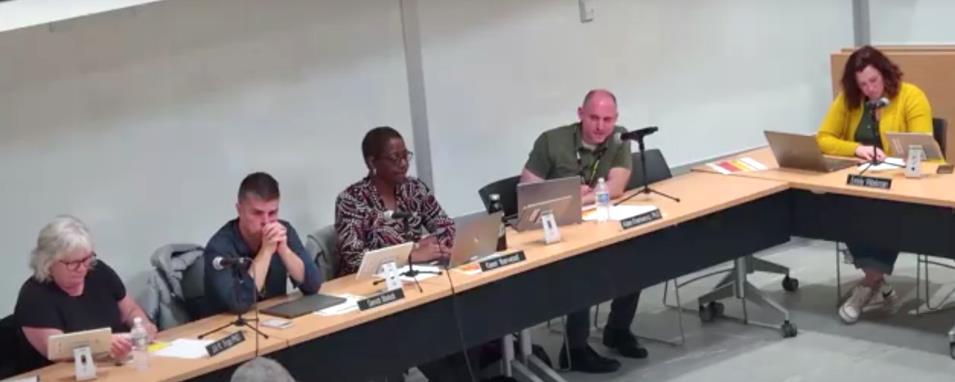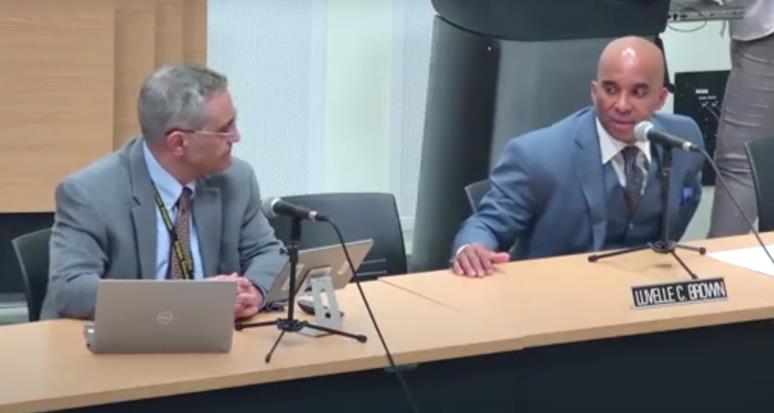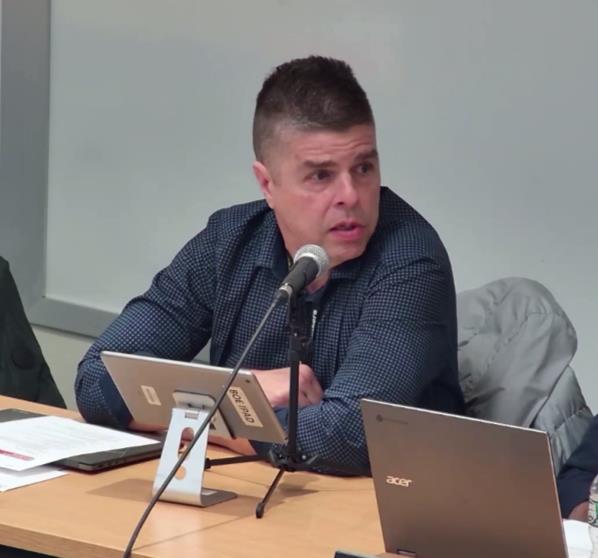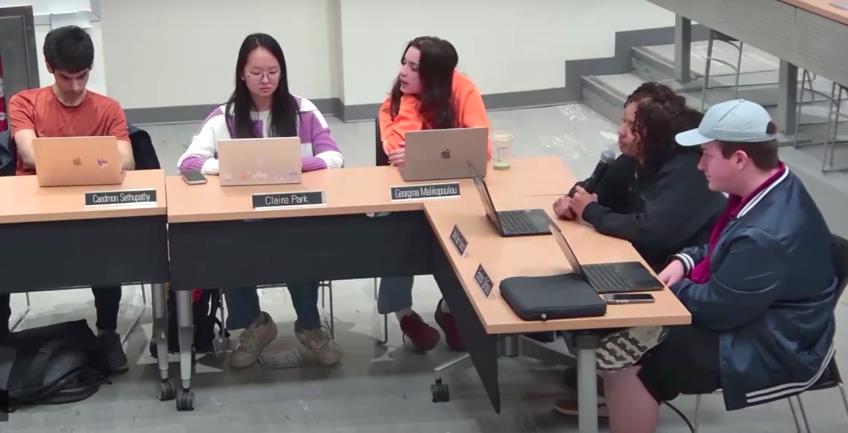ICSD Superintendent would raise spending 4.17 percent, but hold levy hike within tax cap

Reporting and Analysis by Robert Lynch; March 21, 2025
Erin Croyle wasn’t there that night. Had the program-conscious Ithaca Board of Education member attended the board’s March 11 voting meeting, the tenor of the discussion might have evolved differently. Croyle’s presence could have given the meeting a pulse.
Amanda Verba wasn’t there either. The sharp-minded, PowerPoint-driven former Chief Operations Officer for the Ithaca City School District (ICSD), resigned last summer. She migrated to Trumansburg to become business executive of its school system. At Ithaca, Verba had served as much the budget salesperson as the bean counter. Her ICSD successor is much more the green-eyeshade accountant type.
But maybe that’s the mood of the moment for the ICSD. Burned badly by a first-round landslide budget defeat last year, many school board members in Ithaca have now embraced a cautious, taxpayer-respectful approach to budgeting.
Ithaca School Superintendent Dr. Luvelle Brown and Verba’s successor, Dr. Dom Lisi, ICSD’s recently-hired Assistant Superintendent for Business, reflected that penchant for fiscal caution as they provided the board the skeletal outline of a next year’s spending plan whose details they’ll refine and bring back to the board in forthcoming days.
“We’re presenting a rollover budget,” Dr. Brown told the bare board quorum of five who attended March 11th. By “rollover,” the Superintendent meant hold-the-line spending; nothing bold and beautiful; nothing likely to make Erin Croyle smile.

As unveiled that night, Brown’s outline would increase spending by 4.17 percent for the 2025-26 school year. Yet it would raise the tax levy—the true benchmark of taxpayer pain—by only 3.76 percent, a percentage falling into line with this year’s state-calculated “tax cap” as applied to the ICSD.
The proposed spending total is $169,811,365; less than the 2024-25 budget Dr. Brown initially advanced last year, yet larger than a trimmed-down plan that voters last May rejected.
The tax cap is truly an arbitrary number; a fiscal fiction. It changes year to year and district to district. And aside from its propagandistic power in promoting frugality, the only legal significance the number serves is to require at least a 60 percent margin of approval when any non-cap-compliant school budget goes to the voters in a May referendum.
“We want to take what we’re doing this year and continue doing it next year,” Brown advised the school board. “No major additions; and we’re not proposing any major reductions.”
Last year was different. Dr. Brown and district teachers and administrators had loftier plans. Brown was laying the groundwork for a 20 percent hike in teacher pay over a three year period. At this time last year, the Superintendent had proposed a $170.9 Million budget for 2024-25. It would have increased spending by 7.79 per cent, and boosted the tax levy by 12.14 percent, more than three times the increase proposed now.
Even the school board didn’t accept Brown’s—and by her association with it, Amanda Verba’s—first draft. Over several weeks, the board cut the budget’s proposed spending by $2 Million, and pared the tax levy increase to 8.43 per cent.
It still wasn’t enough. Last May, seven out of ten Ithaca voters rejected the district’s first-submitted budget. They also tossed two of three board incumbents out of office, members they’d (rightly or wrongly) faulted as being spendthrifts.
The school board regrouped. Guided by board budget hawk Jill Tripp, it cut spending to $163 Million, reduced the levy hike to 2.92 per cent, and ordered a second referendum. That time, the budget passed.
But to carve away the proposed increased spending, the Ithaca District also cut programs. And some program-friendly liberals fear that too much was lost. No schools got closed. But high school elective courses that drew too few students got chopped away. Administrative positions—including some at the top level—got cut as well.
The 2024 election was one whose lesson was not lost on those who survived and currently populate the Ithaca Board of Education. Three members will face the voters this spring; two more the year after.
“I’m glad that the proposal is staying within the tax cap,” Board Vice-president Adam Krantweiss told Dr. Brown and Dr. Lisi. “It seems like a good start to me.”
Adam Krantweiss was the only incumbent among the three whose terms then expired to survive last year’s election.
“I, too, am pleased to see us coming in at the tax cap,” Jill Tripp remarked. “Thanks for your hard work to get us there,” Tripp told the two administrators.
“My personal view would be that the tax cap is a reasonable way forward,” Garrick Blalock affirmed. “What I heard the public say last year was that that tax cap was what they were comfortable with. I believe that remains the public sentiment. We’ll certainly listen to folks when they come in.”

Blalock’s term expires next year.
True, the tax levy increase being roughed in for next year—3.76 percent—is three-quarters of a percentage point higher than that of the revised budget voters approved last June. But this year’s tax cap is also higher. Still, remember, the tax cap remains a fiction. A levy increase reflects real money.
And by raising proposed spending more than they increase the tax levy, what Brown and Lisi have advanced for starters is technically an unbalanced budget. The gap must be filled, of course, yet only by perhaps raiding savings accounts or adopting a heavy dose of wishful thinking. Think state aid.
“We think we can work through that as we continue to refine the budget,” Dom Lisi told the Board of Education.
As it stands now, a 4.17 percent spending increase coupled with only a 3.76 percent rise in the tax levy would leave a $933,000 funding shortfall to fill. Were the Ithaca District not to raise the levy at all from this year to next, the funding gap would swell to more than $5 Million.
With each of the five adult school board members attending the March 11 meeting reluctant to urge aggressive new spending or exceeding the tax cap, some of the better questions that night came from the high-school age, non-voting student representatives.
If gap-closing money can’t be found, how would the shortfall get remedied, one student asked?

“We’d have to look at either reductions or using fund balance to support that,” the Assistant Superintendent conceded.
Is there any chance of restoring language programs cut in the current year’s budget, another representative, “Claire” asked? Last summer’s reductions eliminated both Mandarin and Latin, the latter course spared only though an outside donation.
“Last year we made some hard cuts, and those cuts I don’t think are going to come back,” Garrick Blalock cautioned. “What remains we want to continue to offer at the highest quality. That’s my general approach.”
Infer from that, Mandarin isn’t likely to return.
“It was a class-size threshold,” Dr. Brown explained. Fifteen students became the cutoff. Brown gave no indication that the criterion would change.
The budget draft that Luvelle Brown and Dom Lisi roughed-in on the 11th was not quite finished. Brown said he first needed school board “feedback” that night. And if five of eight board members sitting in a room can prove an effective gauge of sentiment, one can expect that the more formalized budget that Brown and Lisi will present at the next meeting, Tuesday, March 25, will prove a close-to-perfect reflection of the one briefed to members that earlier night.
And when the Board of Education reconvenes, those not heard from two weeks ago may register their own opinions. Fiscal conservative Todd Fox is likely to argue for economies. Board President Sean Eversley Bradwell is apt to serve as more referee than advocate. And Erin Croyle may attend too. Her passion could pivot the discourse to a whole different level; to more than just dollars.
###

